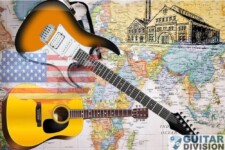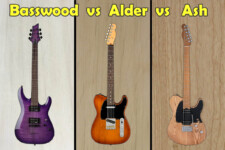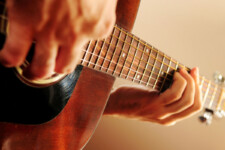Is Basswood Good For Guitars? A Hot Debate!
Ever since Fender started using basswood for their electric guitar bodies in the 1980’s it has been widely used ever since. Basswood is used to make many cheap guitar bodies, but you will also find it in more expensive guitars like Suhr and Music Man.
Some people dislike the bland look of basswood, think the tone is too murky, or think the wood is too soft. However, not all cuts of basswood are the same, as different grades of wood can result in varying tonal properties.
Higher-end guitars use better cuts of basswood that often weigh less but with the same stiffness, giving extra clarity to the tone.
Basswood is great for electric guitar bodies with humbucker pickups fitted, giving an even response across a wide range of frequencies. Many heavy rock and metal guitarists prefer its punchy midrange tone over other commonly used tonewoods.
Not all basswood guitars are good though, and being such a soft wood it certainly has its downsides.
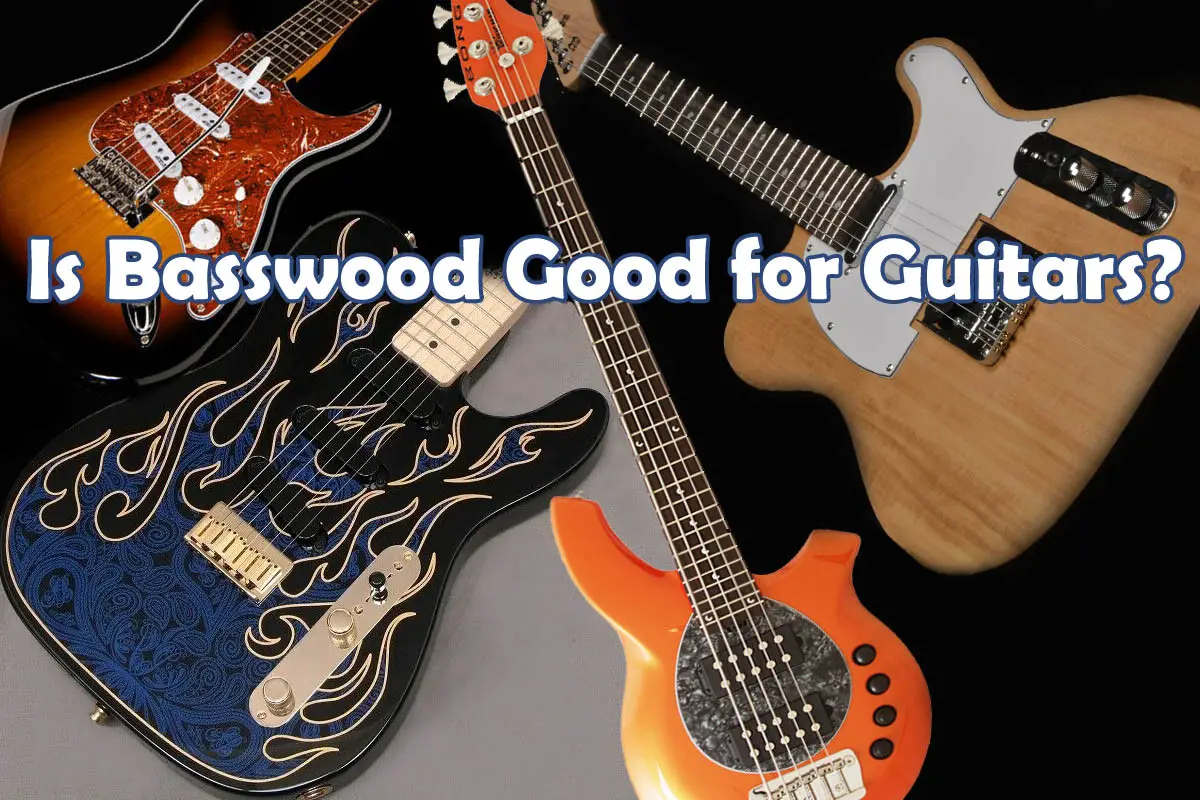
Is Basswood Good for Electric Guitar Bodies?
Plenty of well-known companies like Fender, Ibanez, Peavey, Schecter, Yamaha, Jackson, and Musicman produce basswood electric guitars, and stand by their claims of it being a good tonewood choice.
This is one of the strengths of basswood as it has a similar weight to alder, having a good weight that is light enough to easily hold but heavy enough to stop body-slap.
One common complaint with many guitars made from exotic woods like Honduran mahogany, Indian rosewood is that they are too heavy.
If you’ve ever picked up an early 70’s white ash Fender, you’ll know how quickly they get heavy to hold and play.
There are also many older players who get back, neck, or shoulder pain, and a lighter electric guitar helps them keep playing.
Is Basswood Good for Bass Guitar Bodies?
Basswood is about as commonly used in bass guitars as it is in electrics, and there are mixed opinions about it based on different experiences.
When it comes to tone there are also mixed views, and this is likely down to the fact that no two pieces of wood are the same, just like two identical looking instruments can sound different too.
Check out this video for a great sound comparison between bass guitars made from different woods:
There are a few problems that bass players have experienced with basswood, and one of them is neck dive.
Many bass guitars have hard maple necks and large headstocks, along with large tuners – and this can make them quite neck heavy when paired with a light basswood body. For this reason, many bass players prefer a heavier body wood.
Due to the softness of basswood many players have had issues with the bridge screws coming out, as the string tension is too high for the screws to hold long term.
Regardless of numerous reports of these problems there are many players who are still happy with their basswood basses after many years, possibly they had better quality wood than others.
Is Basswood Good for Acoustic Guitar Bodies?
Basswood isn’t generally used for making acoustic guitar bodies, apart from the furling that joins the top, back, and sides together.
An ideal wood for making resonant guitar tops needs to have good stiffness, and basswood is too soft and flexible. Basswood is only found in cheap acoustic guitars, the sort you’ll probably start out on as a beginner for around $100.
The best description we’ve heard of the sound is that basswood guitars sound flat like listening to music in mono compared to stereo.
Who Plays Basswood Guitars?
There’s a good list of famous players who have used basswood guitars during their career, and many rate basswood as highly as other tonewoods, some preferring it for their individual tastes.
John Petrucci, Joe Satriani, Jeff Beck, Steve Vai, Paul Gilbert, John Petrucci, Eddie Van Halen, James Burton, Guthrie Govan have all played basswood guitars at some point during their careers.
These artists have all performed with basswood guitars at some stage, and many have signature guitars specifically made from basswood.
Let’s not just look at the superstars here though, as they make up a very small number of all the guitarists in the world.
Many guitarists play small venues with poor acoustic spaces, or just play at home. For the average player the perceived value of an expensive guitar made from exotic wood may not stack up against an affordable basswood guitar.
This isn’t to say that all basswood guitars are cheaper, as you can get some pricey Suhr’s and Music Man guitars just to name a couple.
Basswood Electric Guitar List
Here’s a list of electric guitars with basswood construction. This is not an exhaustive list, but should give you an idea of some brands and models of guitars using basswood.
There are plenty of guitar manufacturers who produce basswood guitars such as: Fender, Schecter, ESP, Jackson, Yamaha, Peavey, Epiphony, Suhr, EVH, and Ernie Ball Musicman.
- Harley Benton ST-62 BK Vintage Series.
- MIJ Traditional 50s Telecaster.
- 2006 Fender Telecaster James Burton Signature Model.
- Fender Aerodyne MIJ Telecasters.
- EVH Wolfgang USA.
- Tom Anderson Drop Top Classic.
- Tom Anderson Angel.
- Suhr Guthrie Govan Signature Antique Modern.
- Suhr: 36JST Custom Modern 7 string.
- Suhr J Select Standard Plus.
- Peavey Special.
- Peavey AT-200.
- Peavey Raptor Custom.
- Music Man John Petrucci JP 6 signature model.
- Ibanez JEM777 SK Steve Vai Signature.
- Ibanez JS Series (Joe Satriani).
- Ibanez RG7.
- Jackson USA Signature Misha Mansoor Juggernaut Ht7.
- Music Man Majesty 7 Red Phoenix!
- Charvel USA Guthrie Govan.
- G&L Tribute Doheny.
- G&L Tribute Legacy.
- G&L Tribute ASAT Special.
- Washburn EC-26.
- Washburn WI-14 & 15 Idol Series.
- Washburn X Series.
- Washburn Catanese Series WI15ANCK & WI16ANCK.
Basswood Bass Guitar List
Keep in mind that many bass guitars on this list are not exclusively basswood bodies, and have been produced with a range of options.
- Squire VM Deluxe Active IV.
- Fender Jazz Bass Special.
- Fender Precision Bass.
- Fender Aerodyne Jazz Bass.
- Spector SpectorCore Fretless Bass.
- Spector Q4 Pro.
- Fender MIJ Mustang Bass.
- Mikey Way signature Squier Mustang Bass.
- Squire Vintage Modified Precision Bass.
- Squier Vintage Modified Mustang Bass.
- Squire Classic Vibe Bass.
- G&L SB-2 Tribute Bass.
- G&L Tribute series L-2000.
- G&L Tribute Kiloton Bass Guitar.
- G&L Tribute Fallout Short Scale.
- Ibanez SR800 Bass Series.
- Washburn Bantam Bass Series BB14K & BB15K.
- Washburn Taurus Bass Series.
Basswood Acoustic Guitar List
Acoustic guitars with basswood back and sides are available, however they are all entry-level guitars. This might suit you fine if you’re just starting out and are looking for a $100 or less starter guitar package.
Note that these guitars almost always have a laminated spruce top, it’s the back and sides that are basswood.
- Amazon Basics Beginner Acoustic.
- Vangoa Acoustic Electric Cutaway.
- Fender FA-125CE Dreadnought Cutaway Acoustic-Electric.
- Glen Burton GA204BCO-BK Acoustic Electric Cutaway.
- J&Z Acoustic Classical 3/4 Beginner Guitar.
- Traveler Guitar 6 String Acoustic Guitar.
- Donner 36” Dreadnought 3/4 Size Acoustic Guitar.
Is Basswood Good for Guitars?
Internet forums are flooded with guitar players giving their opinion of basswood, from an extremely negative view through to praising its tonal strengths.
There are arguments based around the softness of basswood and whether that makes it a poor choice for a guitar both for durability and tone.
Many low-cost guitars have been made with basswood, and this has likely impacted people’s attitude toward this controversial wood choice.
There are plenty of manufacturers and luthiers who stand behind basswood constructed guitars, and who claim it’s a good choice for many guitars.
You will also find a line-up of professional players who have specifically requested manufacturers to make their signature series guitars from basswood.
Let’s dig deeper into what basswood is, and why it is both good and bad as a guitar wood.
1. Easy To Work With
Manufacturers love basswood since it’s a cheap wood and is easy to cut, sand, and finish, meaning their tooling lasts longer and helps them reduce costs.
In addition to this it has a fine and uniform end-grain that doesn’t require filling like many other woods, which makes it easy to get a smooth flat finish with minimal effort.
Basswood also lends itself well to a range of finishes anywhere from flat to high gloss without the grain texture showing through, allowing flexibility for different looks.
Using an oiled finish with a darker or color-hued stain can give a great finish to basswood, making it easier to repair if dinged, also hiding the mineral streaks in the grain.
2. Basswood Is Soft and Less Durable
The main negative point is the softness of basswood in respect to guitar construction.
A softer wood can present more problems with hardware mounted with screws, and a few guitarists have complained of screws loosening over time.
It’s not unheard of for a basswood bodied guitar to have the tremolo get loose over time as the screws can more easily tear up through the holes than with a stronger wood.
Some people have also complained that the bolt-on neck has become loose over time, likely due to the wood compressing slightly at the neck joint.
Although this has happened to some, it’s not the universal experience with all players.
“My 20 year old basswood Fender Jazz Bass Special has no indication of loose screws or any issues from soft wood”.
Guitar forum
The other issue with a soft wood is that it dents easily, and any finish over it tends to chip down to the wood surface quite easily also.
The softness of the wood surface can be somewhat mitigated by a thick polyurethane coating, which gives the surface some protection but could also affect tone, take your pick!
3. Is Basswood any Good for Guitar Necks?
Basswood is too soft for neck construction, and over time would end up warping and bending with the string tension.
Harder cuts of basswood could possibly be strong enough for light gauge strings, but for a bolt-on neck, the screws might eventually strip the holes and you would be limited in string choice.
The only exception is the Parker Fly series of guitars made from 1993-2016 where the aim was to reduce the weight of the instrument. Many of the Fly series featured basswood necks, however they were given extra strength with carbon fiber backing, and the use of threaded inserts to bolt the neck onto the body.
Basswood on its own is not a good guitar neck choice – especially not for the higher tension steel strings on acoustic guitars.
Is Basswood Good for Guitar Tone?
Most people agree that basswood boosts the mid-range, with the tone being described as ‘warm’. Being a light and soft wood makes it resonate at lower frequencies.
Although this is a common property of basswood, you can find that two different cuts can sound quite different when tapped, having different tonal qualities depending on where the tree grew and what part of the tree the lumber came from.
American basswood is generally lighter than its Asian counterpart and resonates with higher mid-range tones.
A Question of Tone
“(basswood)…produces a fairly even and full to mid-range response throughout the entire band width. Many guitar enthusiasts agree that it’s well matched with humbucking pickups because basswood produces a lot of the same frequencies that pickups easily recreate”.
Ernie Ball Music Man
Lighter cuts of basswood are usually preferred to the heavier ones, as it produces a more pleasing tone that accentuates the upper middle ranges. Heavier basswood guitars sound a bit more ‘muddy’ having a lower frequency tonal response.
Basswood is popular in guitars for heavier musical styles since it produces a good punchy midrange tone that helps cut through the audio mix, particularly when soloing.
When it comes to pickups, guitarists seem to agree that high-gain pickups like EMG active’s and humbuckers, which are designed to drive that thick clean midrange that hard rock and metal players love.
Guitars Are A Sum of Their Parts
Guitars are not constructed with basswood necks due to its low strength, so basswood bodies are mated with harder woods for the neck like maple, rosewood, or koa.
Since a guitars tone results from the sum of its parts, you can’t just look at basswood on it’s own, as you will get tonal variations depending on the combinations of materials used in construction.
With the infinite possibilities with varying qualities of basswood, different necks, and different hardware, we can only look at the general tone and sustain of basswood.
In reality two different basswood bodied guitars can sound quite different, however you shouldn’t expect a bright high-toned sound.
What Kind of Wood is Basswood?
Basswood is known by a few different names: Basswood, American Basswood, Lime, and Linden, and its scientific name is Tilia Americana. Its name is pronounced as ‘bhass – wood’ (Bass – like the fish), and it is also known as the ‘bee tree’.
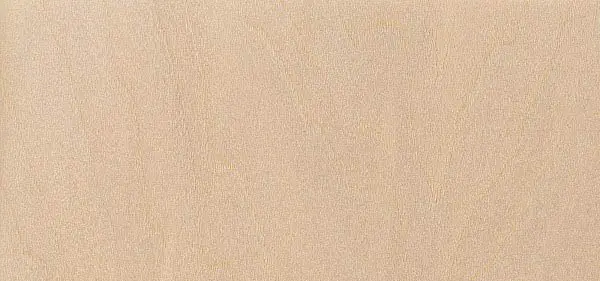
American Basswood grows over much of the Eastern US and is different in appearance to the species that grow in Asia and Europe.
Although one of its names is Lime wood, this is due to the mineral lime green streaking in the grain that is frequently visible, not because of any relation to citrus Lime.
Basswood is technically classed as a hardwood due to its seeds having a hard shell surrounding them and is a soft-grained wood that is easy to work with and compress.
Generally, Basswood is light compared to other hardwoods, although like other woods it can be heavier if growth is slower in a different climate.
The appearance if Basswood is quite plain without a pronounced grain pattern, displaying a uniform pale white to brown color. Woodworkers have noticed that it darkens over time, as many woods do, so the relatively bland appearance may improve a little with age.
Basswood vs Other Guitar Tonewoods
Let’s take a look at basswood vs other common guitar wood choices and see how they compare.
When Basswood is used to make a guitar, it is often used as a foundation to build tone from; combined with other woods to build the tone of the guitar.
1. Basswood vs Agathis
Agathis is not generally known as a good tonewood and is mostly used in very cheap guitars where it produces muddy low tones that are not pleasing to a musically developed ear.
Compared to other woods, agathis is a hard wood similar to oak and is rated around 1350 Janka.
One problem with agathis is that its tonal qualities can change according to the way the timber is seasoned, so can vary from good to bad. Maybe you’ll find a good agathis guitar, but chances are higher you won’t.
2. Basswood vs Alder
Out of all the widely used woods for guitar making, Alder is one of the closest to basswood both in hardness (590 vs 420 Janka) and tonal quality.
Like other woods, there are different strains of alder, however with an abundance of red alder and its great tonal properties it soon became a favorite for many Fender guitars.
Fender regularly feature alder in Stratocasters, Jaguars, Jazzmasters, and their Jazz Bass.
Red alder has rich and strong lows to mids, with more pronounced upper midrange tones than basswood, giving a warm well-balanced tone somewhere in-between basswood and ash.
3. Basswood vs Ash (and Swamp Ash)
There are many different varieties of ash that vary in hardness from black ash and swamp ash (softer varieties) through to white ash which is 1320 on the Janka hardness scale.
Black ash (990 Janka) is harder than basswood (420 Janka), being similar in weight to maple. It is a good choice for guitar bodies due to the bright tone and good sustain it produces and is more durable than basswood.
Swamp ash is a softer variety of ash with roots growing in swampy water, and gives rich bass tones though to light high tones, and is often preferred to harder ash for its smooth timbre.
It is softer than hard ash, but still much harder than basswood (990 vs 420 Janka) and is a lightweight wood that gives and instrument a good weight distribution.
Both black ash and swamp ash are popular guitar woods, however swamp ash is in shorter supply.
With black ash having good acoustic properties, high availability, a pleasing appearance, and being readily available – it is commonly found in guitar construction.
4. Basswood vs Mahogany
Mahogany is heavier than basswood and is twice as hard at 1040 Janka.
In the guitar making world Honduran mahogany (known as genuine mahogany) is the most commonly used variety for guitars.
The name Honduran mahogany refers to the South American species of the tree, with genuine Honduras mahogany being an extremely rare and protected wood.
Luthiers love mahogany for many reasons such as its tonal qualities, versatility, straight grain, and ease of working with tools.
Genuine mahogany can have different initial appearances – being yellowish, reddish, pinkish, or salmon colored when freshly cut, maturing into a deep rich red or brown color with age.
Mahogany is much stronger than basswood, and its versatility makes it good for electric guitar bodies, back and sides of acoustic guitars (can also be a soundboard), and almost any other part of a guitar also.
Basswood has a flatter higher tone than mahogany which has a rich, full, darker tone with good harmonics and sustain.
For long gigs some people find mahogany solid body guitars too heavy, and basswood might be a better choice for some players in this regard.
5. Basswood vs Maple
Maple is quite a heavy and hard wood rated at 1450 Janka, three times the hardness of basswood.
Hard Rock maple is commonly used for guitar neck due to its strength and stability, and when used in combination with a basswood body can help to brighten the tone.
Basswood and maple give entirely different tones, with maple producing punchy bright sounds with a good attack and sustain.
Similar to mahogany a solid body maple guitar is very heavy and can be hard to stand and hold for long periods.
European Flame maple and Quilted maple (American) are medium density woods that regularly feature on electric guitar solid body tops and top plates.
When maple is used for acoustic and semi-hollow electric guitar soundboards it is usually as the top layer of laminate, rarely being used for solid-top acoustics, and helps bring more clarity to the instrument’s tone.
Used as a laminated top for solid body basswood guitars it can work to brighten up the sound while still retaining the strong mids that basswood readily produces.
John Suhr, founder of Suhr guitars, stated that a basswood/maple top combo is his ”holy grail of tone”.
6. Basswood vs Poplar
The poplar species commonly used for guitar making is the American Tulipwood, also known as a tulip poplar, and is similar in appearance to basswood unless you compare the end-grains of the two woods.
Sometimes the question “is Basswood the same as poplar?” is asked, as in many ways they share the same bland appearance, however they are different species of trees.
Poplar and basswood are close in hardness (540 vs 420 Janka) from the standard guitar making woods. Along with alder it has similar tones to basswood but gives clearer upper mid-range tones.
As alder becomes harder to come by and more expensive, some manufacturers are turning to poplar as an alternative with similar tone.
7. Basswood vs Spruce
Here we dive into strictly acoustic territory, as spruce is recognized as the king of guitar soundboard woods, being rarely used for electric guitars.
Sitka spruce is the most commonly used spruce due to its abundance, with Red spruce (Adirondack), Engelmann, and European Spruce also regularly used.
Prices of spruce-top guitars can vary greatly, as fine cuts of AAA grade spruce are harder to source than common construction-grade spruce, with higher grade instruments being crafted from it.
Basswood and spruce are quite similar in Janka hardness, however the big difference with spruce is its stiffness, which greatly exceeds basswood.
- Spruce and basswood are a similar weight, however spruce resonates freely without the flat tones that basswood produces.
Spruce has great projection and tone, with different varieties suiting different playing styles.
Sources
https://www.wood-database.com/basswood/

